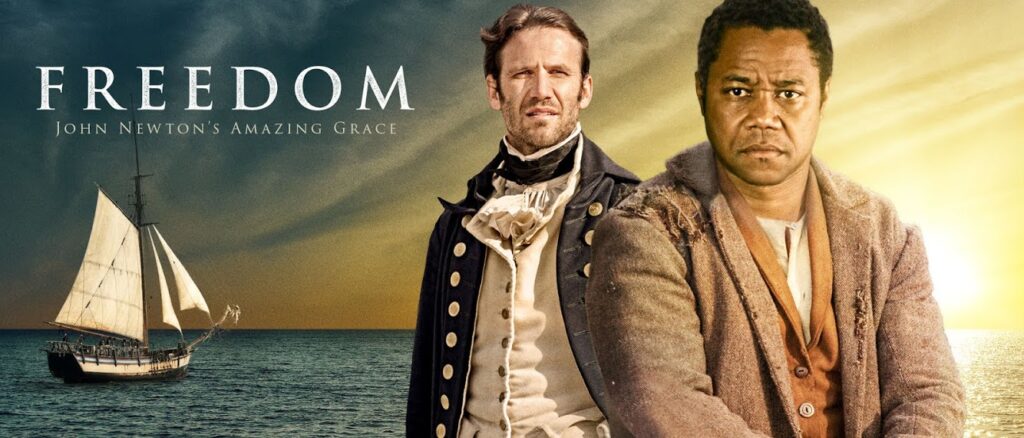
The movie Freedom: the heroic story of slavery in America and England.
Once again, the article I’d written for today sits in draft form waiting completion. A good thing since I’ve still got a couple of books and articles to finish before finishing the piece.
So why did my watching the movie Freedom eclipse what I was working on?
After watching Cuba Gooding Jr’s excellent perfomance in his 2014 movie Freedom, I felt impelled to tell you about it.
John and I discovered this film only because we subscribe to Pureflix, an alternative to Netflix. I learned about Pureflix from our friend Tom Skelton. The intriguing graphic I’ve posted above seemed to jump out at us from the screen as we perused our options.
Scanning the movie’s reviews—almost unanimously dreadful— evoked a smile which derived not amusement but sad irony.
True for two reasons: My own experience with critics and because the snarkiest critiques were about features I loved about this film.
Here are just a few examples.
- The stunning, almost celestial, musical score is called “sanctimonius” by the NY Daily News and “turns the movie into ‘a half-baked musical.”
- The Hollywood Reporter disliked the interwoven stories of the two protagonists. The story of runaway slave Samuel Woodward and the 100-year earlier tale of John Newton, English captain of the slave ship and composer of the hymn Amazing Grace.
- Roger Ebert complained that the film “spends too much time trying to edify it’s viewers…
- Ebert stated that Timothy Chey’s screenplay, which parallels Newton’s and Woodward’s stories, is “kind of a mess.”
Almost always, if “the critics” review the movie as splendid, I dislike it,
even to the point of walking out. Think Manchester By The Sea and Gone Girl for dislike intensely and The Shape of Water for walking out.
The effects of pruience-more accurately pornography— watched alone in the darkness can penetrate us in subtle and dangerous ways. It’s absence in Tom Cruise’s unexpected blockbuster, Top Gun Maverick, reveals that hundreds of thousands of us “crave a reset” from watching gratuitous sex displayed as romance. Few expected Cruise to pull off the sequal successfully. But not only is the film reminiscent of a beloved American moral culture, it’s popularity has outstripped any of its predecessors.
My admiration for the six-year-old movie Freedom: the heroic story of slavery in America and England derives from another absence—that of systemic racism.
There’s no ideology here. No mention of the historical revisionism so embedded in academia that refusal to cow to the narrative results in termination even for tenured faculty.
No.
The story takes heroic and historic figures, black and white: William Lloyd Garrison and Frederick Douglas. And integrates them into a fascinating tale of the anonymous and real men and women of the Undergound Railroad who risk their lives to help Woodward and his family get to Canada. Setting the scene for the war to end slavery.
There’s no political narrative here. And I found it’s absence a relief.
The characters are just people, all sinners like you and me. But this story highlights some who decide they must stop injustice. Not only by speaking out but by risking their lives. That the characters can sing doesn’t detract but immerses us into a culture of faith that sustained, that saved. The parallel story of John Newton’s conversion and writing of Amazing Grace was brilliant. In the summer of 2022, watching this well-crafted creative film Freedom, was uplifting, redemptive and gracious.
Slavery has not ended.
I speak not about the slavery in the movie, Freedom, or even about the slavery of human trafficking or addiction
No, I write about America’s National Slavery—our turning away from God and His Law: The definition of sin. And we are the front lines of the battle to end Slavery each day, each moment.
On October 11, 2019, Attorney General Anthony Barr addressed the Notre Dame Law School. I’ve before and do again about it because Barr explains precisely, eloquently, what is happening to our country.
And why.
In the 20th century, our form of free society faced a severe test.
There had always been the question whether a democracy so solicitous of individual freedom could stand up against a regimented totalitarian state.
That question was answered with a resounding “yes” as the United States stood up against and defeated, first fascism, and then communism.
But in the 21st century, we face an entirely different kind of challenge.
The challenge we face is precisely what the Founding Fathers foresaw would be our supreme test as a free society.
They never thought the main danger to the republic came from external foes. The central question was whether, over the long haul, we could handle freedom. The question was whether the citizens in such a free society could maintain the moral discipline and virtue necessary for the survival of free institutions.
By and large, the Founding generation’s view of human nature was drawn from the classical Christian tradition.
These practical statesmen understood that individuals, while having the potential for great good, also had the capacity for great evil.
Men are subject to powerful passions and appetites, and, if unrestrained, are capable of ruthlessly riding roughshod over their neighbors and the community at large.
No society can exist without some means for restraining individual rapacity.
But, if you rely on the coercive power of government to impose restraints, this will inevitably lead to a government that is too controlling, and you will end up with no liberty, just tyranny.




